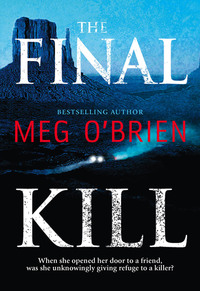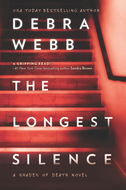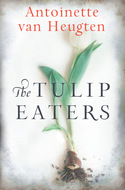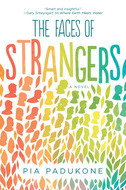Kitap dosya olarak indirilemez ancak uygulamamız üzerinden veya online olarak web sitemizden okunabilir.
Kitabı oku: «The Final Kill»
An excerpt from
THE
FINAL
KILL
Alicia’s smile was tight, her eyes distraught. Her pale blond hair, ordinarily smooth and shiny, was tangled, as if she’d been nervously running her fingers through it.
As for Jancy? Abby remembered her as a cute kid with a brown ponytail, dressed in Catholic school plaids. Now Allie’s child was dressed all in black, had a short, spiked hairdo with orange and purple streaks, and a strange, staring expression in her eyes—which were so heavily made up Abby wondered how she could hold them open.
Still, Helen’s reference to Hades, whether god of the dead or hell, had been a bit strong. Little Jancy had simply become a teenager.
Alicia grabbed Abby’s hands and held on as if they were her only lifeline. “You’ve got to help us,” she said, her voice shaking. “Please, Abby. I couldn’t think of anywhere else to go.”
Looking into Alicia’s familiar green eyes, Abby knew she should be happy to see her old friend. Not only that, but she owed her so much. If Alicia hadn’t helped her, back when her own world was falling apart—
But something was very, very wrong. And some instinct—the kind that raises hairs on the back of one’s neck—told Abby that Trouble with a capital T had just walked through her door.
“Meg O’Brien is a highly skilled writer who keeps things interesting.”
—The Romance Reader on Sacred Trust
Also by MEG O’BRIEN
THE LAST CHEERLEADER
CRIMSON RAIN
GATHERING LIES
SACRED TRUST
CRASHING DOWN
The Final Kill
Meg O’Brien
Dear Reader,
So many people wrote to me about Sacred Trust, saying it was their favorite book of mine, I decided to write a sequel. The Final Kill is that sequel, in that it involves many of the same people and places.
Sacred Trust came out in May 2000 from MIRA Books. It’s not necessary to read Sacred Trust first, but if you’d like to know more about Abby’s life before this story—what happened to her two years ago, her relationship with Ben and with the Prayer House—you can order Sacred Trust by going on my Web site, www.megobrien.com, and clicking on one of the many links to online bookstores on my “Books” page. You can also order any of my books from your local bookstore.
Please also leave a note for me on my Guest Book page. I love to hear from readers, and I answer all Guest Book notes, as well as all e-mail, the address of which is also on my Web site.
With best wishes,
Meg O’Brien
Contents
Prologue
Chapter 1
Chapter 2
Chapter 3
Chapter 4
Chapter 5
Chapter 6
Chapter 7
Chapter 8
Chapter 9
Chapter 10
Chapter 11
Chapter 12
Chapter 13
Chapter 14
Chapter 15
Chapter 16
Chapter 17
Chapter 18
Chapter 19
Chapter 20
Chapter 21
Chapter 22
Chapter 23
Chapter 24
Chapter 25
Chapter 26
Chapter 27
Chapter 28
Chapter 29
Chapter 30
Chapter 31
Chapter 32
Chapter 33
Chapter 34
Chapter 35
Chapter 36
Chapter 37
Chapter 38
Chapter 39
Chapter 40
Prologue
It all began with the lilacs. The day he sprayed the poison and turned them all brown, I knew I would have to kill him.
It felt strange, getting so upset over lilacs. Even stranger was planning a murder over their loss. But what goes around comes around, and Frank Frett himself was a killer. Oh, he might have been a hardworking man, not a bad sort to his friends and coworkers. But I knew that, on his days off, he killed. He killed wildlife, fish, trees, whatever still had a breath to give. I should have known he would get to my lilacs one day.
Lilacs had been my favorite flower since childhood, and I had planted them around the perimeter of my garden shortly after moving here five years ago. There were twelve in all, having grown from two-foot stubs to six-feet high by five wide in no time. They cast a beautiful lavender haze over the daffodils and tulips in spring, and in the summer they lent a nice filtered shade to the hydrangeas and violets. I had put a comfortable wooden bench under one of the lilac bushes that I’d shaped into a tree. More than anything, I loved sitting out there in the shade on hot afternoons.
The lilac bushes also served the purpose of making the wild berry bushes along the fence behind them look more attractive. My little niece, Lolly, who is four, loved coming here in the summer to ride the horses and pick the blackberries. It was something she looked forward to every summer, and it had felt good to be able to provide this kind of fun for her. Toward the end of the summer I’d bake juicy, sweet pies from the berries and sit them on the windowsill to cool, the way my grandmother always had back home. I’d invite my sister and Lolly to come over and finish them off with me, and we’d play Scrabble amid the leftover piecrust crumbs.
But of course, when Frank Frett murdered the lilacs, he got the blackberries, too. The spray must have blown everywhere, even hitting the top of a beautiful old maple tree that used to turn a gorgeous gold and copper in the fall.
Let me be clear about this. It wasn’t so much the loss of the lilacs themselves, although that was bad enough. It was the total disregard for living things, and the devastation. By the time Frank Frett had finished with his spraying, the entire perimeter of the garden looked as if an army had come through it with a flamethrower. I have no idea how many days after the spraying it was before I looked out one morning and saw it—the otherwise green, lush garden entirely circled now by pitiful brown shrubs and trees.
I had complained, of course. I told him that he might have warned me ahead of time. Even given me a chance to argue the point. After all, I paid him a hefty month’s rent, and legally, as long as a tenant is current on the rent, the property belongs to the tenant—not the landlord.
He argued that only the house belonged to the tenant, not the land. And he hadn’t had time to cut the lilacs and berry bushes back this year. To spray poison on them was the quickest and easiest way to go.
I wanted to say that if he’d spent less time camping, fishing and killing deer, he might have had enough time left over to cut the berries back.
Oh, I know. There are far more things to worry about in life than some dead lilac trees and crispy-crunch berry bushes. There’s the war in the Middle East—whichever one is going on at any given time. And there’s South Africa. There are people being slaughtered and starving over there, and young kids here buying engagement rings with conflict diamonds in them, blithely unaware of what they’re doing, but saving a penny or two. Here in the United States, in fact, there are homeless people all over the streets of every major city.
So what’s the big deal about lilacs?
It’s only a big deal because it matters to me. It cuts me to the quick to know they’ve been poisoned, every bit as much as if he’d taken an ax to them and chopped them right down. They mattered to me. I’d waited all winter for them to bloom. Now they wouldn’t bloom for years, if ever. And Frank Frett didn’t give a damn that he’d killed these things that I’d loved.
There was, therefore, only one thing to do: I would have to kill the killer.
1
Abby Northrup wasn’t, by nature, vengeful. In fact, it was more in her nature to be at peace, especially since she’d come to live in this private little apartment at the Prayer House. There were times, however, and situations…
She took the small sheaf of papers she’d been reading and set them down on the table next to her chair. Carrying her cup of lukewarm coffee, she went into her office and sat at her computer. Opening a new document, she began to write out a plan. There was no rage in her words, no heat. Just a hard, cold resolution.
She did it as a Q & A: Where is the lilac killer now? Out in the potting shed? Or has he gone into town? And what should she use? Poison? Ah, yes. The perfect karmic weapon.
Better yet, an ax. Or perhaps a knife from the kitchen. But Sister Edna would surely spot it missing. Would she turn her in? Or cover for her? Would anyone understand why she’d done what she’d done?
The abbey bells sounded a solemn tone over her head, announcing the midnight hour. The timing was perfect. She began to jot down her plan, and drew a map of the property alongside her keyboard. Here was the garden shed. And here the stables, then the well house. Or perhaps she’d find him in the little shack on the hill that hadn’t been used in years, except for that one time when someone…
A shiver ran through her. Never mind that now.
She would go first to the stables. If he wasn’t there, she would wend her way across the field to the well house. It was on the way to the shack on the hill, so if she hadn’t found Frank Frett by then, she’d just keep going uphill.
Leaving her office, she went into the adjoining living room. There she took a gun and ammunition from the antique Spanish armoire. Quietly shutting the armoire doors, she crossed to her bedroom, where she removed her jeans and shirt and slipped on cargo pants and a plain black jersey with long sleeves. Next she strapped the ammo around her belt. She dragged her hiking boots out from under the bed, then pulled them on. Finally, she stood still for a moment with her eyes closed and her arms out, level with her chest. I am strong, she said silently to herself. I will not fail.
Opening her eyes for one quick look around, she didn’t see it at first. Then it was there, on her pillow, as if it had appeared through some ancient magic spell while her eyes were closed.
Which was foolish, of course. It was only a piece of paper. A note, put there hours ago while she was still in her office.
She stooped down and picked it up. It read:
You won’t win. Don’t even try.
2
So her quarry knew she was after him. She ignored the note, crushing it in her fist and tossing it into a corner. Picking up her gun bag and equipment, she stepped out into the tiled hall, listening for any unusual sounds. There were three floors to the old Spanish abbey, each of them with someone living on them, but it didn’t surprise her that she didn’t hear a thing. No one here ever spoke after midnight.
Across the wide, semidark hallway from her apartment was a carved oak door. She opened it and went swiftly through a short, narrow corridor and then a door that opened into a rose garden near the front of the house.
It was a little before one a.m. now, and June gloom was upon the entire Carmel Valley, bringing damp, biting temperatures. As she stepped outside she cursed herself for forgetting a jacket. Too late to turn back for one, though.
Just above the rim of a nearby hill, a half moon veiled by clouds managed to look eerie rather than helpful. It cast no solid shadows, only pale glimmers of gray that turned every would-be shadow into formless, evanescent ghosts moving deep within it. She pulled a small flashlight out of her pants pocket, turning it on but shading it with her other hand and pointing it only toward the ground. It was important to watch for snares.
Newly blossoming roses assailed her nostrils with a rich scent that was far too powerful, overriding all other senses. She quickly moved away from the garden, keeping her back against the wall of the adobe convent. Along this side was an arched stone colonnade over a cobbled walk. She followed the colonnade to the field in back, where several small buildings stood. One was a women’s center for learning, another the horse barn and another a greenhouse. A tiny adobe chapel had been built several yards behind the convent by a couple of runaway Carmelite friars in the 1600s. They put down stakes here when the rest of their party sailed off, and after they died, no one lived here until the early 1900s, when the nuns came. They found the humble little monastery the friars had built and expanded it for their use.
The gentle old friars, Abby thought, would never have been the type to murder living, growing things. If there were lilacs in their gardens back then, they would have brought them inside in huge, fragrant bunches to dress their kitchen table for breakfast, lunch and dinner.
As she paused there on the edge of the field, her mind played tricks. Several coastal live oaks dotted the ankle-high grass, their black branches dripping with moss that swayed and twisted like angry snakes in the dank wind. The perfect setting for the demise of one Frank Frett, she thought, shivering.
Or me.
She shook herself, feeling a tremor of anxiety. Focus, Abby.
It worried her that her mind had been wandering. Did her target know she would do that? Did he know she’d be an easy mark, once surrounded by her beloved gardens and the multitude of wonderful scents in the night air? That she’d go off on some historical reverie of days gone by and lose her concentration for the job at hand?
Possible. He knew too much about her, didn’t he? So, then. She would have to go against her norm, act in some way he wouldn’t expect.
Carefully steering away from the oak trees and the greenhouse beyond them, she picked her way along a rutted track to the horse barn. Thick old eucalyptus trees lined the track, but they were too far apart to provide absolute cover. Abby crouched and moved swiftly but silently between each one, standing only when she knew she couldn’t be seen from the windows lining this side of the dilapidated barn.
Barely breathing, she listened for even the slightest sound. Certain rustlings, she knew, came from the four horses inside, softly snorting. Now and then a hoof thudded against the floor of a stall. The other sounds were night animals: raccoons, mice, coyotes. Of them, the raccoons worried her the most. She’d gone up against the fierce little buggers more than once, and they’d love nothing more than to chomp down on her foot and run off with it. At one point, when she’d tried to shoo one away outside the Prayer House kitchen, he’d grabbed the broom from her and carried it off in his paws.
A spotlight at the front of the barn shone bright as day on a corral and about fifty square feet of open ground. Both stood between her and the barn. The thought of being that exposed worried her, but she had no other choice. If Frank Frett was in there and she ran to the greenhouse and gardening shed without first checking out the barn, she would only be handing him her back.
Watching a few moments, she didn’t catch any movement at the windows along this side of the old building. Still, she knew there were cracks here and there in the wooden siding where the boards had warped from the winter’s hard rains. Frett could have stationed himself at one of those cracks, where he could easily see out, yet be invisible to her.
Abby took her gun from its bag and held it at the ready, then ran as silently as she could toward the barn. Her heart pounded under the too-bright spotlight, and the only thing in her mind was, He can see me now. The man is evil, spawn of the devil, and if he’s at one of those windows, he can see me now. Her imagination, always in top form, was so strong she could almost feel him grabbing her from every side. He was before her, no, behind her, he had a finger on the trigger of his own gun—
Damn.
As she came within feet of the barn, she saw that one of the two big doors in front, usually locked up at night, stood half-open. An invitation.
How considerate. But sorry, Frank. I have other plans.
Veering off toward the far side of the building, she ran the way she’d been taught, barely touching the ground and with little sound. But as she reached that side, her heart jumped to her throat.
The usual porch light wasn’t on over here.
The fixture was on the wall at the far end of the stable. It should have illuminated this side dimly—just enough to see if someone else had gotten here before her—but the bulb had apparently burned out. Or Frett had knocked it out. It was so black here, it felt like the dark side of the moon. And the air was thick. Thick with fear. She thought she heard another heart beating, and her legs turned to jelly.
Several moments later, she realized she was hearing the heartbeat of one of the horses on the other side of the barn wall. Only then did she know that her hearing had improved because her own heart had actually stopped a few beats. She’d been holding her breath so long, it was a wonder she hadn’t passed out.
She sucked in air, steadied herself and listened a few more moments for any human sounds.
Nothing.
But that might not matter. Frank Frett would know better than to reveal himself that carelessly. He could be anywhere inside the stables—in the tack room, the feed room, in Sister Ellen’s office—and no matter where he was, he wouldn’t make a sound.
She was so sure of that, she made an on-the-spot decision and did what any impulsive, get-the-job-done person like her wouldn’t do.
She sat down.
She didn’t barge in screaming like a banshee, hoping to shock her target and take him by surprise, risking a shot in the back. Nor did she sneak around to the back door or through a window the way he’d expect her to.
No, he’d be covering the back door, the windows, all the routes she might take to outwit him. After all, she was the type to barrel right in, wasn’t she? That was pretty much what he’d said the other day, mixing both clichés and awkward metaphors. “You’re an open book, Abby, and anybody can hear you coming a mile away.”
Much to her chagrin, she had to admit he was at least half-right.
So, instead of the expected, she just sat down.
It shouldn’t take long, she thought, squatting and easing her back against a tree opposite the barn wall. Five or ten minutes of absolute silence, and if he was in there, he’d get impatient and wonder where she was. He’d come out—and that’s when she’d get him. Frank Frett wasn’t the type to sit around, and several minutes without any kind of movement from her would drive him nuts.
While she waited, she imagined the things she would do to the lilac killer, once he was good and dead. She’d get something from the gardening shed…lye, perhaps. Yes, lye. That should do it. She’d dig a grave just deep enough to dump him in it. Then she’d pour the lye over his entire body. It would eat away at his skin and other mucous membranes in no time. His eyes would go first, but whether it would eat through his bones, she didn’t know. It really didn’t matter. The pain is what mattered. The same kind of pain her lilacs had felt when they were burned by poison at the hands of Frank Frett.
Lye, she recalled, was what they used when they buried people in the old days to prevent diseases from spreading. She remembered, too, a story about St. Margaret Mary, who claimed to have had visions of the Blessed Mother and was told by her to begin a devotion to the Immaculate Heart of Mary. She did, and it was said that when they dug her up years later, her heart was still red and fresh, that the lye hadn’t touched it. It was God’s grace that her heart was preserved, the Church said, because of her love for the Blessed Mother. It was one of the miracles, Abby thought she recalled, that was used to prove her a saint.
Well, Frank Frett’s heart would never be touched by God’s grace. If they ever dug him up, they’d find it was cold, black and hard as a rock. Even lye couldn’t eat through a heart that hated lilacs.
A too-sweet smell of hay filtered through the wall of the stable, along with the sweaty odor of horses in their warmed stalls. Abby’s nose began to itch, and she pressed a finger under it to keep herself from sneezing. That did nothing for the smell of manure, which was faint but enough to make her empty stomach clutch. She hadn’t eaten in twelve hours, and she was hungry suddenly, though not in a good, healthy way. Instead, she really thought she was about to vomit. Covering her mouth with both hands, she gulped back the bile that rose in her throat, telling herself over and over, It’s okay, it’s okay, it’s okay. Just don’t make a sound, not a sound.
It was Frett himself who saved her. Just when she thought she couldn’t hold it back any longer, she heard movement at the rear of the barn. She forgot all about throwing up and crouched, moving that way, listening for a direction. Then she saw him. He was crouching, too, and then running from the barn toward the little chapel, his body nothing more than a black form about fifty feet ahead of her.
She brought her gun up and pointed it at his back. “Stop!”
He twisted around, his own weapon raised. But she’d taken him by surprise, and she shot first. He went down.
Abby ran over to him, touching his leg with her foot. He didn’t move, and the splattered red blotch on his chest told her she’d hit her mark.
“Gotcha,” she said softly. “Your days of poisoning lilacs are over, Frank Frett.”
“You think so?” he taunted, grabbing her pant leg and yanking at it. She was so surprised, she lost her footing and fell, dropping her gun. Stumbling to her feet, she picked it up, but he was already running again. Reaching a live oak tree, he stood behind it for cover, and she ran in a zigzag pattern until she was close enough to shoot again.
It didn’t work, and she saw it coming before she felt it. He stepped out from behind the tree and aimed his Shocktech 2003 at her. The thrust went straight to her heart, and she went down with an enormous rush of breath and a moan.
She wasn’t faking it the way he had. The pain was sharp and stinging, and for a few seconds everything went black. Then, her vision clearing, she saw “Frank Frett” kneeling over her in the person of Ben Schaeffer, her lover, his face twisted in anger.
“Dammit all to hell, Abby! Why aren’t you wearing your protective gear? A face mask, at least! Paintballs can blind you, you know.”









